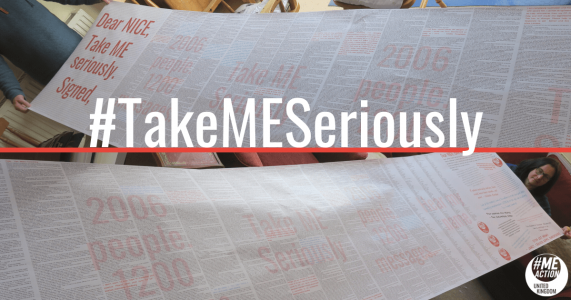In light of an oncoming wave of people experiencing post-viral complications and potentially post-viral ME, telling our story is more important than ever.
“I would expect that people who have Covid-19 symptoms quite severely, of those, I would expect about 10% to have fatigue-like syndromes after 6 months, given current evidence.” – Professor Chris Ponting, University of Edinburgh
If I had been warned about the dangers of exercise I would not have deteriorated as badly as I have. – Louise, Congleton, Cheshire
In February we shared the decision and reasoning of the National Institute for Health and Care Excellence (NICE) not to add any note or warning to the recommendation of graded exercise therapy (GET) in the existing ME guidelines prior to the publication of the updates. We felt it was important to give the community a right to respond, considering the exceptional levels of harm inflicted by GET.
You told me to exercise. I did…. I’m now housebound, I can’t walk, talk, bathe. You did this. – Janet, Rotherham
We didn’t, however, inundate NICE with emails at a time of international crisis. Instead, we proposed sending NICE a giant card. To our surprise, 2006 people wished to have their name on it, and 1200 wrote messages along with their names.

To fit all your messages on, we needed a card that was 6 metres in length!

We have already seen NHS trusts disseminating unsubstantiated advice that GET is safe and appropriate for post-COVID fatigue syndromes.
First: do no harm! Remove harmful treatments for ME from the guidelines now. – Cathy, Old Lyme Ct
We initially delayed sending this card, so as to allow NICE time to focus on their response to the pandemic. However, as increasing numbers of people with COVID-19 are reporting post-viral complications, it is more important than ever that NICE read the messages from our community.
My daughter got worse after taking doctor’s advice to take exercise. She became bed bound for almost 6 years. Any number of years is too many. Not only has she missed out on having a family, but I have lost 6 years in looking after her. One patient saved from this awful illness is often a family saved. – Ros, St. Albans
We have previously been assured that the decision to add a note or warning to the guidelines lies with NICE staff and not with committee members who rightly need to be on the front line. Therefore, we trust NICE can consider the altered circumstances and greater implications of a harmful recommendation staying in place in the coming days and weeks without pulling clinicians away from vital work.
If taken seriously earlier, lives could have been saved… act now! – Collette, London

More of your messages:
The misinformation provided by my doctor delayed more appropriate treatment and prolonged my suffering. – Lori, Northampton
I’m 16 and ME has taken my life for the last 3 years and I continually get more and more fed up of how terrible I feel all the time. It sucks. And no one knows how to help. Please take us seriously. Nobody deserves to be living like this – Megan, Dorset
While NICE provide information as a guideline, many professionals use it as the only way for patients to receive treatment. If NICE have received evidence from patients of possible harm being caused by the GET and CBT methods currently suggested, then it should be removed from guidelines until further investigations have been made. The continuation of potential harmful treat would be unacceptable in any other chronic illness, please use the same principle for ME suffers. – Angela, Sheffield
Perhaps you are unaware of the extreme nature of the harm that has, and is, being caused by GET. NICE cannot recommend dangerous “therapies” and then absolve itself of responsibility for the consequences. – Marie, Knutsford, Cheshire
If there’s any room for doubt on efficacy of GET, it must be withdrawn. One gym session resulted in months of recovery. Do some research by asking sufferers! – Heena, East London
Please listen to our community – Georgina, London





 ) and a message about #MillionsMissing with your own networks. Desktop: Download by right clicking on the image or clicking on the download icon in the bottom right corner of the image. Mobile:
) and a message about #MillionsMissing with your own networks. Desktop: Download by right clicking on the image or clicking on the download icon in the bottom right corner of the image. Mobile:
